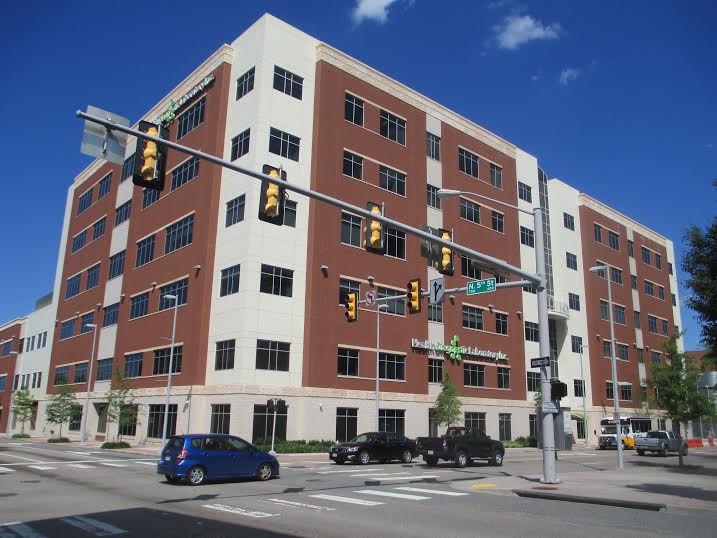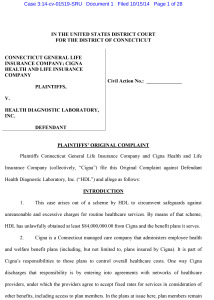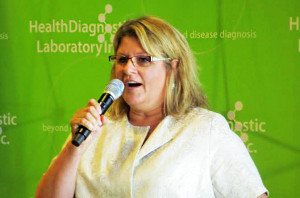
Health Diagnostic Laboratory, headquartered on North 5th Street, is facing a lawsuit from an insurance provider. Photos by Burl Rolett.
The body blows keep coming for HDL.
In the past two months, Richmond-based Health Diagnostic Laboratory has had much of its business model called into question by the Wall Street Journal and said goodbye to its CEO. And last week the firm was hit with a lawsuit from a large national health insurance company seeking more than $80 million in damages.
Cigna, a Connecticut-based insurer, claims HDL extracted more than $84 million in fraudulent payments in what it alleges as scheme that involved waiving out-of-pocket fees for patients and then billing inflated rates to the insurance company.
“HDL has developed a business model designed to game the healthcare system by submitting grossly inflated, phantom charges to Cigna that do not reflect the actual amount HDL bills patients,” the suit reads. “The effect of HDL’s scheme is to deceive health benefit plans into paying far more for services than the plans are obligated to pay.”
Cigna filed the case in federal court in Connecticut on Oct. 15, after what it called an independent investigation of HDL’s dealing with Cigna customers. The company claims it sent out questionnaires to members who had used HDL’s services and received 27 responses.
The lawsuit claims that HDL advertised its services as free to patients and did not bill any of those 27 Cigna members. Cigna claims it wasn’t aware of the cost waive to patients until after it launched its investigation.
“Cigna was only able to confirm HDL’s fraudulent billing practices through a special investigation of HDL, after which Cigna began reducing or denying payment for its claims submitted by HDL,” the suit reads.
Because HDL is outside of Cigna’s network, the suit claims, patients should have to pitch in for their services. That’s a vital part of the insurance pool process that incentivizes customers to seek in-network healthcare, it argues.
In one example, Cigna said HDL filed a claim with the insurer for more than $2,900, a figure that under that specific patient’s health plan would have required that person to pay $649 out of pocket.
HDL did not bill the patient at all, Cigna alleges. The insurer calculated that the patient’s plan left it with a $1,742 bill that it paid to HDL. HDL never actually intended to receive the full amount they billed, Cigna says, but instead used the inflated number to induce a higher payment from the insurance company.
The suit accuses HDL of a “fraudulent ‘fee forgiving’ scheme” that undermines the insurance system by unfairly promising free services to out-of-network patients.
Cigna further argues that “fee forgiving” is a recognized variety of medical billing fraud.
Cigna alleges that by not billing the customer for its service, HDL drove patient demand for its product at the expense of the insurance company.
The suit, which was first reported by The Richmond Times-Dispatch, makes claims under eight counts, including unjust enrichment, fraud and negligent misrepresentation. In addition to seeking reimbursement for the alleged fraudulent charges, Cigna asked the court to prevent HDL from making similar charges going forward.
Cigna seeks the return of all of $84 million it claims to have paid HDL as well as exemplary and punitive damages, court costs and attorneys’ fees.
HDL spokesman Jeff Kelley said the company has a policy against commenting on pending or threatened litigation.
An attorney and spokeswoman for Cigna also declined to comment on the case beyond information provided in the lawsuit.
Cigna is also going after healthcare firms Texas Spine and Joint Hospital and a group of about 20 Maryland surgery centers for alleged fee forgiving campaigns, according to lawsuits filed in federal district courts for those two states. Cigna cited internal investigations in their complaints in each of those cases as well.
Last month, a Wall Street Journal report called into question HDL’s practice of paying fees to doctors for processing and shipping blood samples to HDL’s for its panel of tests.
The Journal reported that HDL for a time paid $20 per blood sample and payouts to some physicians totaled thousands of dollars per week. That practice was discontinued in June, HDL has said, “in light of recently issued government guidance” on the issue.
Shortly after the Journal report, HDL co-founder and CEO Tonya Mallory stepped down from her post. The company said Mallory’s resignation was not related to the WSJ report or the pending federal investigation it referenced.
HDL was founded in 2008 and makes its business on blood tests it claims can help doctors predict illnesses like heart disease. The company has often been celebrated as a Richmond business success story, with about 700 local employees as of June 2014. And over the summer it opened a new $100 million headquarters in the Virginia Biotechnology Park.

Health Diagnostic Laboratory, headquartered on North 5th Street, is facing a lawsuit from an insurance provider. Photos by Burl Rolett.
The body blows keep coming for HDL.
In the past two months, Richmond-based Health Diagnostic Laboratory has had much of its business model called into question by the Wall Street Journal and said goodbye to its CEO. And last week the firm was hit with a lawsuit from a large national health insurance company seeking more than $80 million in damages.
Cigna, a Connecticut-based insurer, claims HDL extracted more than $84 million in fraudulent payments in what it alleges as scheme that involved waiving out-of-pocket fees for patients and then billing inflated rates to the insurance company.
“HDL has developed a business model designed to game the healthcare system by submitting grossly inflated, phantom charges to Cigna that do not reflect the actual amount HDL bills patients,” the suit reads. “The effect of HDL’s scheme is to deceive health benefit plans into paying far more for services than the plans are obligated to pay.”
Cigna filed the case in federal court in Connecticut on Oct. 15, after what it called an independent investigation of HDL’s dealing with Cigna customers. The company claims it sent out questionnaires to members who had used HDL’s services and received 27 responses.
The lawsuit claims that HDL advertised its services as free to patients and did not bill any of those 27 Cigna members. Cigna claims it wasn’t aware of the cost waive to patients until after it launched its investigation.
“Cigna was only able to confirm HDL’s fraudulent billing practices through a special investigation of HDL, after which Cigna began reducing or denying payment for its claims submitted by HDL,” the suit reads.
Because HDL is outside of Cigna’s network, the suit claims, patients should have to pitch in for their services. That’s a vital part of the insurance pool process that incentivizes customers to seek in-network healthcare, it argues.
In one example, Cigna said HDL filed a claim with the insurer for more than $2,900, a figure that under that specific patient’s health plan would have required that person to pay $649 out of pocket.
HDL did not bill the patient at all, Cigna alleges. The insurer calculated that the patient’s plan left it with a $1,742 bill that it paid to HDL. HDL never actually intended to receive the full amount they billed, Cigna says, but instead used the inflated number to induce a higher payment from the insurance company.
The suit accuses HDL of a “fraudulent ‘fee forgiving’ scheme” that undermines the insurance system by unfairly promising free services to out-of-network patients.
Cigna further argues that “fee forgiving” is a recognized variety of medical billing fraud.
Cigna alleges that by not billing the customer for its service, HDL drove patient demand for its product at the expense of the insurance company.
The suit, which was first reported by The Richmond Times-Dispatch, makes claims under eight counts, including unjust enrichment, fraud and negligent misrepresentation. In addition to seeking reimbursement for the alleged fraudulent charges, Cigna asked the court to prevent HDL from making similar charges going forward.
Cigna seeks the return of all of $84 million it claims to have paid HDL as well as exemplary and punitive damages, court costs and attorneys’ fees.
HDL spokesman Jeff Kelley said the company has a policy against commenting on pending or threatened litigation.
An attorney and spokeswoman for Cigna also declined to comment on the case beyond information provided in the lawsuit.
Cigna is also going after healthcare firms Texas Spine and Joint Hospital and a group of about 20 Maryland surgery centers for alleged fee forgiving campaigns, according to lawsuits filed in federal district courts for those two states. Cigna cited internal investigations in their complaints in each of those cases as well.
Last month, a Wall Street Journal report called into question HDL’s practice of paying fees to doctors for processing and shipping blood samples to HDL’s for its panel of tests.
The Journal reported that HDL for a time paid $20 per blood sample and payouts to some physicians totaled thousands of dollars per week. That practice was discontinued in June, HDL has said, “in light of recently issued government guidance” on the issue.
Shortly after the Journal report, HDL co-founder and CEO Tonya Mallory stepped down from her post. The company said Mallory’s resignation was not related to the WSJ report or the pending federal investigation it referenced.
HDL was founded in 2008 and makes its business on blood tests it claims can help doctors predict illnesses like heart disease. The company has often been celebrated as a Richmond business success story, with about 700 local employees as of June 2014. And over the summer it opened a new $100 million headquarters in the Virginia Biotechnology Park.


That’s a gem. Big Insurance fraudsters claiming they are being defrauded. A little dose of their own medicine.
This is exactly the kind of nonsense that drives up healthcare costs for all of us.Too bad it’s a Richmond company, but if it’s true “that fee forgiving is a recognized variety of medical billing fraud,” this is likely just the tip of the iceberg… There should be a Medicare investigation as well to find out of they’ve been fraudulently sucking up tax money.
I’m guessing that Cigna’s payment system “thought” the amount being billed by HDL was the remainder after the patient’s out-of-network copay. And that Cigna’s payment system has no early warning system or in-house monitors to research and vet out-of-network providers. To the tune of $83 million? Using the example in the story, the overpayment approximates 22% of the $83 million ($18.26 million) OR $83 million is 22% of the amount actually paid to HDL ($377.27 million). Either way, Cigna seems to be blaming its losses on its own lack of internal controls. I wonder if it initially sent a claim… Read more »